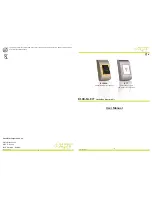
Glossary
Activation
– Due to the European customs regulations, the import of digital video recorders
is more expensive than the import of digital video playback devices. For this reason,
manufacturers of camcorders have started to modify their products for the European market
by disabling the DV input. Some smart developers didn't take long to find ways to remove this
limitation. This procedure is called "Activation". This activation is required to transfer video
material from external sources to a DV camcorder. Activators are available for almost all types
of camcorders, and can be bought legally at your retailer.
AVI
– A Windows video format.
Bitrate
– Indicates the amount of a data transferred per second. The higher the bit rate, the
better the quality. There are two types of bit rates: Constant (e.g. for -> VCD) and variable (e.g.
->SVCD and -> DVD. In contrast to the constant bit rate, the variable bit rate is aligned to
picture material.
Blue Screen
– A Variation of -> Chroma Keying
Capture
– Another word for recording.
Chroma Keying
– Chroma keying uses a mono colored surface, to record , for example, an
actor in front of it. When the recorded video is edited, the mono colored surface may be
replaced by another background.
Chrominance
– Chrominance indicates the color signal in ->YUV, which consists of two color
components. U is the balance between red and cyan, while V is the balance between yellow
and blue.
Clip
– A small piece of video material.
Color saturation
– Indicates the amount of color in a picture.
Composite Video
– Composite Video is a transmission process used in the consumer section.
It is processed over a cinch connector and is often used with TV sets. In this procedure, all
signals (chrominance and luminance) are transmitted with only one cable. The Composite
Video's quality is worse than, for example, in -> S-Video, where chrominance and luminance
are transmitted separately.
CPU
– Central Processing Unit. The part of your computer that actually calculates (I. E.
Pentium or Athlon)
36
VideoSystem Cameo 600 DV (English)
D8
– Digital 8 is the successor of Hi8 or the VHS-C format for camcorders. Though it is still
recorded on Hi8 or D8 cassettes, it uses a digital DV format.





































